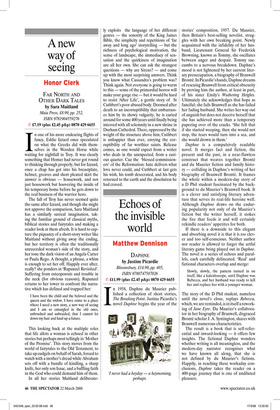Echoes of the invisible world
Matthew Dennison
DAPHNE by Justine Picardie Bloomsbury, £14.99, pp. 405, ISBN 9780747587026 ✆ £11.99 (plus £2.45 p&p) 0870 429 6655 In 1958, Daphne du Maurier published a collection of short stories, The Breaking Point. Justine Picardie’s novel Daphne begins the year of the stories’ composition, 1957. Du Maurier, then Britain’s best-selling novelist, struggles with her own breaking point. Newly acquainted with the infidelity of her husband, Lieutenant General Sir Frederick Browning, known as Tommy, she oscillates between anger and despair. Tommy succumbs to a nervous breakdown. Daphne’s mood is not lightened by her current literary preoccupation, a biography of Branwell Brontë. In Picardie’s hands, Daphne dreams of rescuing Branwell from critical obscurity by proving him the author, at least in part, of his sister Emily’s Wuthering Heights. Ultimately she acknowledges that hope as fanciful; she fails Branwell as she has failed her fading husband. She writes her way out of anguish but does not deceive herself that she has achieved more than a temporary papering over of the cracks. ‘She felt that if she started weeping, then she would not stop, the tears would turn into a sea, and she would drown in them.’ Daphne is a compulsively readable novel. It merges fact and fiction, the present and the past, in a near-flawless construct that weaves together Brontë and du Maurier fiction and family history — colliding in Daphne’s writing of her biography of Branwell Brontë. It frames the whole within a modern-day story of a D Phil student fascinated by the background to du Maurier’s Branwell book. It is a clever and satisfying literary adventure that serves its real-life heroine well. Although Daphne draws on the enduring popularity not only of du Maurier’s fiction but the writer herself, it stokes the fire that feeds it and will certainly rekindle readers’ appetites for both.
If there is a downside to this elegant and absorbing novel it is that it is too clever and too self-conscious. Neither author nor reader is allowed to forget the artful literary game being played out in Daphne. The novel is a series of echoes and parallels, each carefully delineated. ‘Real’ and fictional characters overlap and merge:
Slowly, slowly, the pattern turned in on itself, like a kaleidoscope, until Daphne was Rebecca, and her husband was ready to kill her and replace her with a younger woman.
The story of the D Phil student, nameless until the novel’s close, replays Rebecca, which, we are reminded, is in itself a reworking of Jane Eyre. Du Maurier’s collaborator in her biography of Branwell, disgraced Brontë scholar J. A. Symington, shares with Branwell numerous characteristics.
The result is a book that is self-referential and inward-looking — it offers few insights. The fictional Daphne wonders whether writing is all meaningless, and the modern-day narrator recognises what we have known all along, that she is not defined by du Maurier’s fictions. Happily, in reaching these workaday conclusions, Daphne takes the reader on a 400-page journey that is one of undiluted pleasure.


















































































 Previous page
Previous page